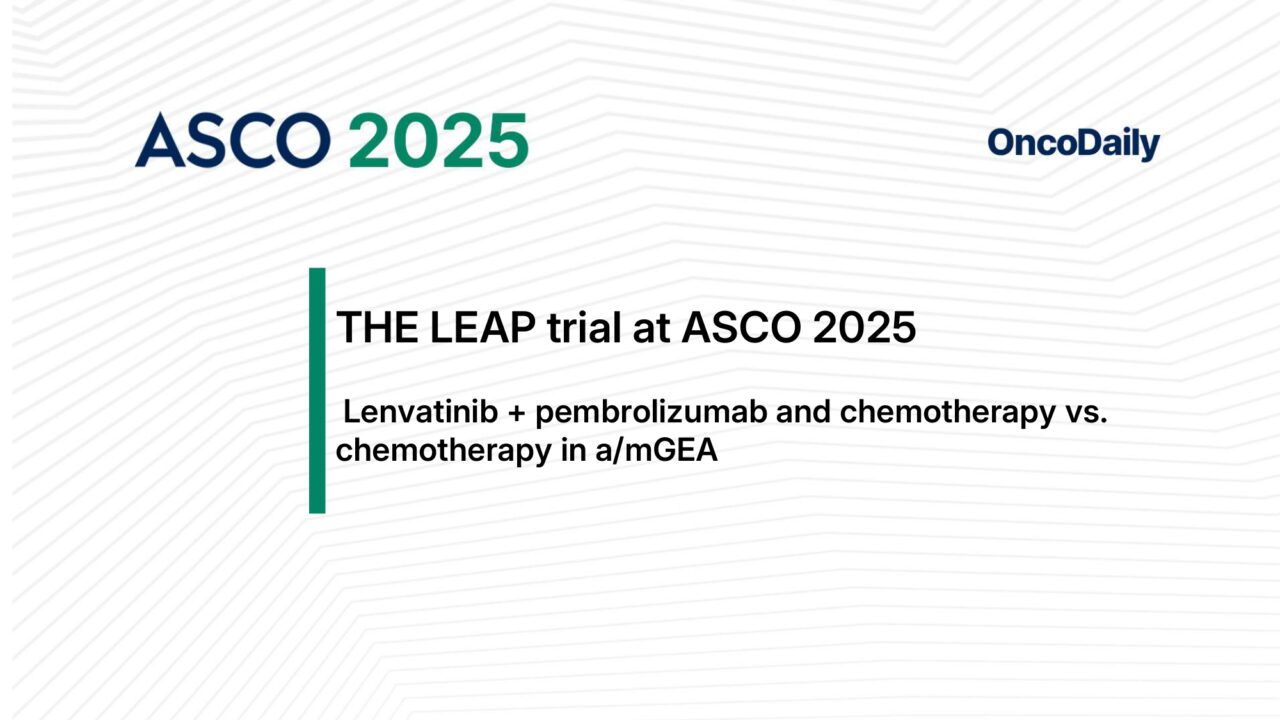
THE LEAP trial at ASCO 2025 : Lenvatinib+pembrolizumab and chemotherapy vs.chemotherapy in a/mGEA
The LEAP-015 trial, presented by Sun Young Rha, MD, PhD, from Yonsei Cancer Center, Yonsei University College of Medicine at ASCO 2025, evaluated pembrolizumab in combination with lenvatinib and chemotherapy as a first-line treatment for patients with advanced or metastatic HER2-negative gastroesophageal adenocarcinoma.
Background
Advanced gastroesophageal adenocarcinoma is an aggressive malignancy with limited treatment options, particularly for patients with HER2-negative disease. Although checkpoint inhibitors have improved outcomes in subsets of patients, optimal first-line combinations remain under investigation. The LEAP-015 trial (NCT04662710) was designed to assess whether the addition of pembrolizumab and lenvatinib to standard chemotherapy could enhance clinical outcomes in this population.
Methods
This open-label, randomized Phase 3 study enrolled patients with previously untreated, HER2-negative, locally advanced unresectable or metastatic gastroesophageal adenocarcinoma. Eligibility criteria included measurable disease and an ECOG performance status of 0 or 1. Patients were stratified by geographic region, ECOG PS, and chemotherapy regimen.
Study Design
A total of 880 patients were randomized in a 1:1 ratio to receive:
- Triplet arm: Pembrolizumab (400 mg IV every 6 weeks × 2), lenvatinib (8 mg orally daily), and investigator’s choice of CAPOX (Q3W × 4 cycles) or mFOLFOX6 (Q2W × 6 cycles) as induction therapy. This was followed by pembrolizumab (400 mg IV Q6W for up to 16 doses) and lenvatinib (20 mg daily if 8 mg was tolerated ≥3 weeks) as consolidation.
- Control arm: Chemotherapy alone (CAPOX or mFOLFOX6).
The dual primary endpoints were progression-free survival (PFS) and overall survival (OS) in patients with PD-L1 combined positive score (CPS) ≥1 and in the overall study population. Secondary endpoints included objective response rate (ORR), duration of response (DOR), and safety.
Results
Among the 880 randomized patients, 78% had PD-L1 CPS ≥1 and 75% had gastric as the primary tumor site.
Follow-up: Median follow-up was 32.2 months for PD-L1 CPS ≥1 and 31.8 months for all patients.
Progression-Free Survival (PFS):
- In PD-L1 CPS ≥1: Median PFS was 7.3 months in the triplet arm vs 6.9 months in the chemotherapy-alone arm (HR 0.75; 95% CI 0.62–0.90; P = 0.0012).
- 24-month PFS was 20% vs 7%.
- In the overall population: Median PFS was 7.2 vs 7.0 months (HR 0.78; 95% CI 0.66–0.92; P = 0.0019); 24-month PFS was 21% vs 8%.
Objective Response Rate (ORR):
- PD-L1 CPS ≥1: 59.5% with the triplet vs 45.4% with chemotherapy.
- All patients: 58.0% vs 43.9% (P < 0.0001 for both comparisons).
Overall Survival (OS):
- In PD-L1 CPS ≥1: Median OS was 12.6 months with pembrolizumab plus lenvatinib and chemotherapy vs 12.9 months with chemotherapy alone (HR 0.84; 95% CI 0.71–1.00; P = 0.0244). The result did not meet the predefined boundary for statistical significance (P threshold = 0.0204).
- In all patients: Median OS was 13.1 vs 13.0 months (HR 0.87; 95% CI 0.75–1.01); OS in the ITT population was not formally tested due to the hierarchical testing strategy.
Safety:
- Drug-related adverse events were reported in 98% of patients in the triplet arm vs 92% in the chemotherapy-alone arm.
- Grade ≥3 adverse events occurred in 65% vs 49%.
- Grade 5 events were reported in 5% of patients receiving pembrolizumab + lenvatinib + chemotherapy compared to <1% in the control group.
Key Findings
The LEAP-015 trial demonstrated that pembrolizumab combined with lenvatinib and chemotherapy led to meaningful improvements in progression-free survival and objective response rates in a largely PD-L1-positive population with advanced gastroesophageal adenocarcinoma. However, the regimen did not show a statistically significant overall survival advantage and was associated with a higher toxicity burden. These results suggest potential for disease control, but also highlight the need for individualized treatment decisions and further refinement of combination strategies in this patient population.
- LEAP-015 met its co-primary endpoint of improved PFS in both the PD-L1 CPS ≥1 population and the overall study cohort.
- ORR was also significantly higher in patients receiving the triplet regimen.
- However, OS benefit did not reach statistical significance in PD-L1 CPS ≥1 patients and was not tested in the all-comers group.
- Safety data indicated a higher rate of severe and fatal adverse events with the combination therapy.
Key Takeaway Messages
- Pembrolizumab plus lenvatinib and chemotherapy significantly improves PFS and response rates in patients with HER2-negative advanced gastroesophageal adenocarcinoma.
- The absence of a clear OS benefit at final analysis limits the enthusiasm for routine clinical implementation.
- The higher incidence of serious treatment-related toxicities underscores the need for careful patient selection and monitoring.
- Further biomarker-driven investigations are warranted to identify subgroups most likely to benefit from this intensified treatment approach.
You can read the abstract here.
-
Challenging the Status Quo in Colorectal Cancer 2024
December 6-8, 2024
-
ESMO 2024 Congress
September 13-17, 2024
-
ASCO Annual Meeting
May 30 - June 4, 2024
-
Yvonne Award 2024
May 31, 2024
-
OncoThon 2024, Online
Feb. 15, 2024
-
Global Summit on War & Cancer 2023, Online
Dec. 14-16, 2023
